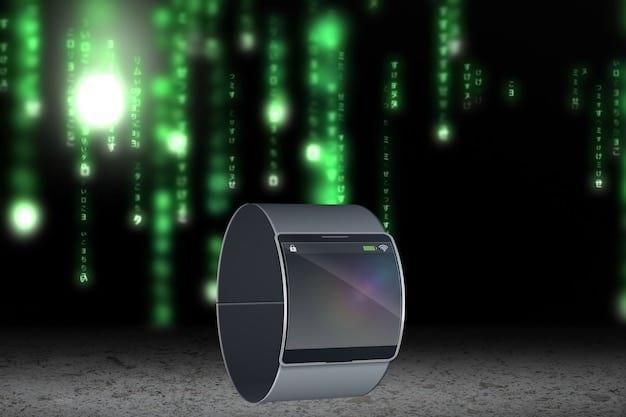Best Crypto Wallets Under $100: Secure Storage in 2025

Crypto wallets under $100 offer secure methods for storing digital assets in 2025, combining affordability with essential security features to protect cryptocurrencies, making them an accessible option for new and seasoned investors alike.
Securing your cryptocurrency doesn’t have to break the bank. Discover the best crypto wallets under $100 in 2025 that balance security, affordability, and user-friendliness.
Understanding Crypto Wallets: Why You Need One
Before diving into specific wallet recommendations, it’s crucial to understand why a crypto wallet is essential for anyone involved in digital currencies. Think of a crypto wallet as your bank account for cryptocurrencies.
It allows you to securely store, send, and receive digital assets like Bitcoin, Ethereum, and other altcoins. But unlike traditional bank accounts, you are responsible for the security of your crypto wallet.
Custodial vs. Non-Custodial Wallets
One of the main distinctions between crypto wallets is whether they are custodial or non-custodial. Understanding this difference is key to choosing a wallet that suits your security preferences.
Custodial wallets, often offered by exchanges, hold your private keys on your behalf. This is convenient, but it means you are trusting the exchange to secure your funds. Non-custodial wallets, on the other hand, give you complete control of your private keys, making you solely responsible for their security.
Types of Crypto Wallets Available
Crypto wallets come in several forms, each with its own set of advantages and disadvantages. The most common types include hardware wallets, software wallets (desktop and mobile), and paper wallets.
- Hardware Wallets: Physical devices that store your private keys offline, offering a high level of security.
- Software Wallets: Applications installed on your computer or mobile device that allow you to manage your cryptocurrencies.
- Paper Wallets: A printed piece of paper containing your public and private keys. While simple, they can be risky if not stored properly.
In conclusion, understanding the different types and functionalities of crypto wallets is vital for safeguarding your digital assets. The right wallet depends on your individual needs and risk tolerance, but it’s always essential to prioritize security when choosing a cryptocurrency wallet.

Key Features to Look for in a Budget-Friendly Crypto Wallet
When searching for crypto wallets under $100, it’s essential to prioritize features that provide security and convenience without exceeding your budget. Don’t assume cheaper means less secure; focus on what features are included.
Focusing on the core areas can help you find a good balance between price and functionality, ensuring your digital assets are kept safe without breaking the bank.
Security Features: The Non-Negotiables
Security should be your top priority when choosing a crypto wallet. Look for wallets that offer features like two-factor authentication (2FA), multi-signature support, and strong encryption.
Two-factor authentication adds an extra layer of security by requiring a second verification method, such as a code sent to your phone. Multi-signature support requires multiple approvals for each transaction, making it harder for hackers to access your funds.
User Interface and Ease of Use
A user-friendly interface is also crucial, especially if you’re new to cryptocurrency . The wallet should be easy to navigate and understand.
Look for wallets with a clean, intuitive design that allows you to quickly send, receive, and manage your cryptocurrencies. Check for mobile apps compatibility for ease of access on mobile as well.
Supported Cryptocurrencies
Consider which cryptocurrencies the wallet supports. If you hold a variety of altcoins, make sure the wallet supports all of them.
- Consider multi-currency support
- Examine ERC-20 token compatibility
- Assess support for newer cryptocurrencies
When selecting a crypto wallet under $100, remember to prioritize security features, ease of use, and the range of supported cryptocurrencies. By carefully evaluating these factors, you can find a wallet that provides the necessary protection and convenience without straining your budget.
Top Hardware Wallets Under $100 for Maximum Security
Hardware wallets are considered the gold standard for securing your digital assets. These physical devices store your private keys offline, protecting them from online threats. Luckily, there are some excellent crypto wallets under $100.
They offer a robust solution for keeping your cryptocurrencies safe from hackers and malware, making them an essential tool for anyone serious about crypto security.
Ledger Nano S
The Ledger Nano S is one of the most popular hardware wallets on the market, known for its affordability and ease of use. Although it costs around 60 dollars, it punches way above its weight class.
It supports a wide range of cryptocurrencies and offers robust security features, including a secure element chip that protects your private keys. The device is compact and easy to carry around, making it a convenient option for users on the go.
Trezor One
The Trezor One is another excellent option for a hardware wallet under $100. It offers similar functionality to the Ledger Nano S, with support for a wide variety of cryptocurrencies and a user-friendly interface.
The Trezor One also features a secure bootloader that verifies the integrity of the device’s firmware, preventing malware from compromising your private keys.
KeepKey
The KeepKey hardware wallet is a secure and straightforward way to store and manage your cryptocurrency. It can often be found under $100 and boasts some impressive security features.
- Large Display for Transaction Verification
- Compatible with Multiple Wallets
- Strong Community Support
Investing in a hardware wallet like the Ledger Nano S, Trezor One, or KeepKey provides a significant boost to your crypto security. These devices keeps risks to digital assets very low and don’t cost a fortune, making them an ideal choice for both beginners and experienced crypto holders.
Best Software Wallets Under $100 (Free Options Included)
If you’re looking for a more budget-friendly option, software wallets are a great alternative to hardware wallets. Many excellent software wallets are available for free, offering a balance of security and convenience. These crypto wallets under $100 come in desktop and mobile versions, ensuring you can manage your digital assets on the go.
Software wallets store your private keys on your device, so it’s crucial to take precautions to protect your device from malware and unauthorized access. Always use strong passwords, enable two-factor authentication, and keep your software up to date.
Exodus
Exodus is a popular multi-currency wallet with a user-friendly interface and a built-in exchange. It supports a wide range of cryptocurrencies and offers a portfolio tracking feature that allows you to monitor your holdings in real-time.
Electrum
Electrum is a lightweight Bitcoin wallet known for its speed and simplicity. It offers advanced security features like multi-signature support and hardware wallet integration.
Trust Wallet
Acquired by Binance, Trust Wallet is a mobile-only wallet that supports a wide range of cryptocurrencies, including Ethereum and ERC-20 tokens. It also features a built-in Web3 browser that allows you to interact with decentralized applications (dApps).

Software wallets offer a convenient and affordable way to manage your cryptocurrencies. Whether you choose a desktop or mobile wallet, remember to prioritize security by using strong passwords, enabling two-factor authentication, and keeping your software up to date. Options like Exodus, Electrum, and Trust Wallet are great starting points, offering a mix of security, features, and user-friendliness.
Evaluating Security: How to Keep Your Crypto Safe
Security is paramount when dealing with cryptocurrencies, and choosing a secure wallet is just the first step. It’s equally important to adopt best practices to protect your digital assets from theft and fraud. It’s essential to understand how to keep your crypto wallets under $100 safe.
These tips ensures you aren’t leaving your crypto out in the cold for somebody to take.
Enable Two-Factor Authentication (2FA)
Two-factor authentication adds an extra layer of security to your crypto wallet by requiring a second verification method, such as a code sent to your phone, in addition to your password.
This makes it much harder for hackers to access your account, even if they manage to steal your password.
Use Strong, Unique Passwords
Use strong, unique passwords for your crypto wallet and other online accounts. Avoid using easily guessable passwords like your name, birthday, or common words.
A strong password should be at least 12 characters long and include a combination of uppercase and lowercase letters, numbers, and symbols.
Keep Your Software Up to Date
Keep your crypto wallet software and operating system up to date with the latest security patches. Software updates often include fixes for security vulnerabilities that hackers can exploit.
- Regularly Update Wallet Software
- Update Operating System
- Beware of Phishing Attempts
Securing your crypto involves more than just choosing the right wallet. By enabling two-factor authentication, using strong passwords, keeping your software up to date, and being cautious of phishing scams, you can significantly reduce the risk of losing your digital assets. Prioritize vigilance so you don’t end up a victim.
The Future of Affordable Crypto Wallets: What to Expect in 2025
As cryptocurrency becomes more mainstream, the demand for affordable and secure wallets is likely to increase. In 2025, we can expect to see even more innovative and budget-friendly crypto wallets under $100 hitting the market.
Emerging trends and new technologies such as increased competition and technological advancements are continually enhancing wallet capabilities. These trends will improve the security, convenience, and affordability of crypto wallets, making them more accessible to the general public.
Increased Competition
The increasing popularity of cryptocurrency is driving more companies to enter the crypto wallet market. This increased competition is leading to lower prices and more innovative features, benefiting consumers.
New wallet providers are constantly emerging, offering a wider range of options at competitive prices. We can expect this trend to continue in 2025, making it even easier to find a secure and affordable crypto wallet.
Technological Advancements
Advancements in blockchain technology and cryptography are also contributing to the development of more secure and user-friendly crypto wallets.
For example, multi-party computation (MPC) technology is enabling the creation of wallets that distribute private keys across multiple devices, making it much harder for hackers to steal them. We can expect to see more wallets incorporating MPC and other advanced security features in 2025.
Focus on User Experience
As cryptocurrency becomes more mainstream, wallet providers are increasingly focusing on improving the user experience. This includes simplifying the interface, adding more educational resources, and providing better customer support.
In 2025, we can expect to see wallets that are even easier to use, even for those with no prior experience with cryptocurrency. These improvements will also allow for more secure crypto holdings.
| Key Point | Brief Description |
|---|---|
| 🛡️ Security First | Prioritize wallets with 2FA, multi-sig, and strong encryption. |
| 📱 User-Friendly | Choose wallets with intuitive interfaces for easy navigation. |
| 🪙 Coin Support | Ensure the wallet supports all the cryptocurrencies you hold. |
| 🔒 Hardware Options | Hardware wallets like Ledger Nano S and Trezor One offer maximum security under $100. |
Frequently Asked Questions (FAQ)
▼
A crypto wallet stores your private keys, enabling you to manage your digital assets like Bitcoin and Ethereum. You need one to securely send, receive, and store your cryptocurrencies independently without relying on exchanges.
▼
Hardware wallets store private keys offline on a physical device, offering higher security against online threats. Software wallets store keys on your computer or mobile device, providing convenience but potentially lower security.
▼
Prioritize wallets with strong security features like two-factor authentication, multi-signature support, and encryption. Consider hardware options like Ledger Nano S or software wallets with good reputations and user reviews.
▼
If you have a recovery phrase or backup, you can restore your wallet on a new device. Without a backup, your funds are likely irretrievable, emphasizing the importance of securely storing your recovery phrase when setting up the wallet.
▼
Some free crypto wallets can be safe, but it’s essential to do thorough research and choose reputable options. Ensure the wallet has strong security features and positive user feedback to minimize risks associated with free services.
Conclusion
Choosing the right crypto wallet under $100 involves balancing security, usability, and your specific needs. Whether you opt for a hardware wallet like the Ledger Nano S or a software wallet like Exodus, prioritizing security best practices is crucial for protecting your digital assets. As the cryptocurrency landscape evolves, staying informed and proactive will help you confidently manage your crypto holdings.





